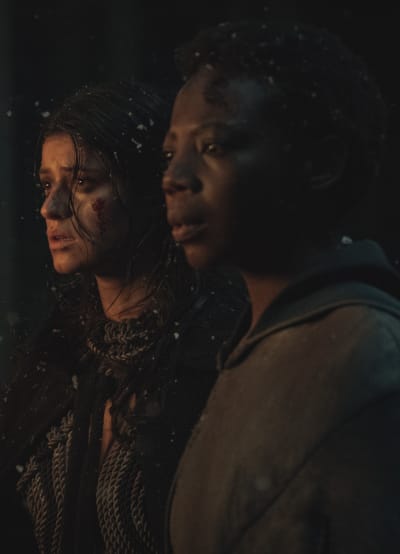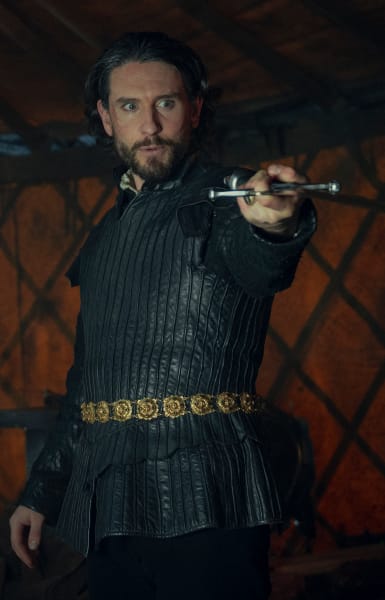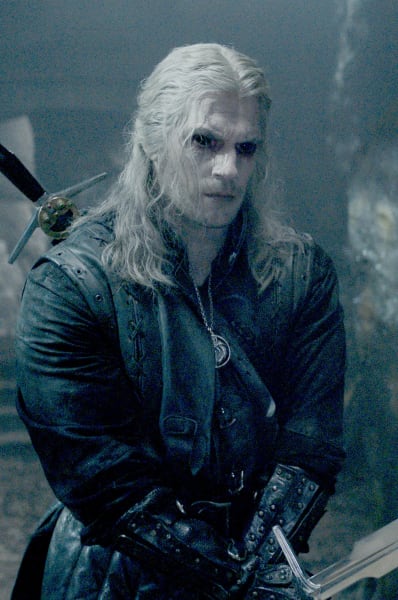The Witcher Season 3 Episode 2 Review: Unbound
 Diana Keng
at
.
Diana Keng
at
.
There are a lot of moving parts on The Witcher Season 3 Episode 2, and it shreds the narrative throughline as we divide our attention between not only Geralt and Yennefer but Jaskier and Tissaia and Fringilla AND Emhyr. Oh, and hello, Cahir!
I suspect the threads will dovetail eventually -- they always do, eventually -- but it makes for challenging viewing as we're pulled between wine cellar dungeons, castle laboratories, fortresses, and blacksmith shops.
Recognizing the season's brevity, I expect there's some urgency to get players in place before the central action accelerates. But there are a lot of details fighting for our attention.
If we begin in Cintra, I'd say Fringilla's plight is the more interesting, especially since it's a pleasant surprise she wasn't executed for lying to The White Flame.
I mean, yeah, she also drugged and murdered the Nilfgaardian generals on The Witcher Season 2 Episode 7, but that's far more forgivable than trying to deceive the Emperor, right?
In any case, her new wine taster/poison detector role is a distinct step down from head mage and de facto ruler, but it doesn't blunt her vision.
Fringilla is an optimist at heart and intelligent enough to manifest ways to actualize her intentions.
Even if it means stowing away in a body bag to escape. It's a rather clever, if morbid, twist on the "hiding in the laundry" trope.
Meanwhile, elsewhere in Cintra, Emhyr regales his swordsmith with a story of how a dwarven sword won him a kingdom.
It's a hefty bit of exposition that doesn't serve a discernible purpose besides letting Emhyr talk at length -- something he hasn't done before -- and allow him to state for the record his plan to unite The Continent under his Pax Duny.
One detail that twigs as odd is his mention of having his queen at his side. Is that meant to be Ciri? Ick.
One day, I may be queen, and I’ll need to use what I’ve got. And what I’ve got is a sense of justice, a dagger, and quick reflexes.
Ciri
Speaking of Ciri, her behavior here is more than a little reminiscent of Daenerys Targaryen as she set out to right the world before reclaiming the Seven Kingdoms.
Both are white-blonde royals with high ideals and a short-sighted sense of consequence.
Yennefer: We should have taught you about consequences.
Ciri: Consequences are just an excuse not to act.
Of course, there are significant differences in their resources. One can only imagine what Ciri would do with dragons at her command.
Her visions are understandably disturbing. Unlike Ithlinne on The Witcher: Blood Origin, Ciri hasn't grown up experiencing them with a mother who accepts and understands the ability.
She also differs from Ithlinne in her compulsion to try to thwart the future she glimpses.
To be fair, she only seems to see tragic futures. Not being able to communicate the danger ahead to the people she sees dying would be exceedingly frustrating for someone used to taking control of situations.
Yennefer: At Aretuza, you can learn to focus your visions on the future you actually want to see.
Ciri: And what if I don’t want to see anything?
Yennefer: Well, then you’re blind to the big picture.
By this point, Yennefer has realized she's not equipped to train Ciri in her magical abilities. What she can do is provide the girl with some perspective and scope.
It’s not enough to possess Chaos. You and I, we must learn to control it. That is the essence of power. That is how we will move mountains. Together.
Yennefer
Sharing her history can't be easy. Yennefer's lived over fifty years with the physical perfection she demanded and suffered for at Aretuza.
Letting Ciri see what and where she came from is her carrying through on her pledge of absolute candor.
And while she gets comfortable with rigorous honesty, ahead at Aretuza, Triss Merigold is finding it hard to be truthful with herself or Tissaia.
Magic is organizing Chaos. This requires two things. Balance and control. Without them, Chaos will kill you.
Triss
Everything at Aretuza has deeper meaning. The relationships are double-edged, the conversations layered, alliances conditional, and no one is safe.
Finding blood on the wall in Nissa's room seems to indicate a more conventional if disguised, monster has come calling.
Again, I'm sure this will all connect eventually, but throwing a murder mystery into the mix is a bit much.
Jaskier's deal with the Redanians fills me with unease. While he'd like to think he's capable of handling himself in political arenas, Radovid is a new and unknown player, while keeping secrets from Geralt has not been a wise move historically.
There's a lot of subtext in how Jaskier and Radovid interact. The question is whether it's mutual or if Radovid is catfishing the bard to gain his trust, affection, and loyalty.
If we return to the lesson on consequences, I wonder whether the blame for Codringher and Fenn's firey demise can be laid at Jaskier's feet for informing the Redanians or at Geralt's for visiting them in the first place.
Mind you, Rience probably wasn't going to toast them until Codringher let slip they knew about his master's plans. Oops.
Geralt's hunt for Rience turns up the requisite monster quota.
While the jackapace on The Witcher Season 3 Episode 1 was frightening in its single-mindedness, it was a straightforward hunter-predator.
The creatures Geralt fights in the caverns below Vuilpanne are grotesque and weirdly pathetic. That all but the heads have been melded together into the attacking monster while their heads cry out from the walls is quite the definitive abomination.
It's also the first use of witcher potions so far this season. He didn't bother with the jackapace.
The code Geralt lives by is fascinating. He is a self-identified monster created to fight monsters. Survival is the minimum objective.
However, when Codringher and Fenn recommend picking up a decoy for Ciri, he refuses to entertain the idea of using an innocent to shield his ward.
Codringher: Geralt, my friend, a time of contempt is approaching. Deep and utter contempt. My proposition is a simple solution. Someone has to die so someone else can live.
Geralt: I will not pay for what I love by having contempt for myself.
So what does Destiny do? It drops a flaxen-haired, green-eyed girl who believes she is Ciri right in his lap.
What will Geralt do with this not-Ciri child?
Better question: What will Ciri do when she meets not-Ciri?
Key question: Why would Rience's master effectively (and magically) clone Ciri? What is the purpose of the not-Ciri?
Place your bets, Fanatics. Who holds Rience's leash? Is it Istredd? Stregobor? Could it be one of the female mages?
Is their play magical or political? Or both?
Hit our comments below and toss a coin to your reviewer!
Diana Keng was a staff writer for TV Fanatic. She is a lifelong fan of smart sci-fi and fantasy media, an upstanding citizen of the United Federation of Planets, and a supporter of AFC Richmond 'til she dies. Her guilty pleasures include female-led procedurals, old-school sitcoms, and Bluey. She teaches, knits, and dreams big. Follow her on X.













